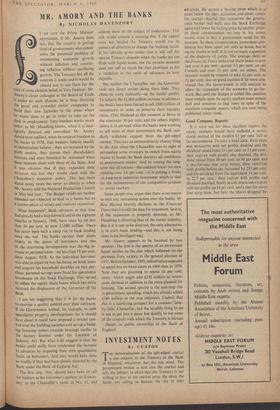MR. AMORY AND THE BANKS
By NICHOLAS DAVENPORT under no such illusion; he is busy directing the great and powerful motor companies to build their new factories in the areas where he wants them to go in order to take up the slack in employment. Tory freedom works much better, as Mr. Maudling knows, when it is intel- ligently directed and controlled. Mr. Amory should have realised, when he restored freedom to the banks in 1958, that bankers behave exactly as industrialists behave—they are actuated by the Profit motive, they pursue their shareholders' interests and must therefore be restrained when these interests clash with those of the State. And 't was obvious that if they expanded their advances too fast they would clash with the Chancellor's economic policy. This has been stated many times but never so clearly as when Mr. Amory told the National Production Council in May last year : The Budget reliefs are neither intended nor expected to lead to a boom but to a further phase of steady and cautious expansion.'
What happened? Bank advances at that time had already had a leap forward and in the eighteen months to January, 1960, have risen by, no less than 50 per cent. to over £3,000 million. There has never been such a steep rise in bank lending since the war. The banks opened their doors Widely to the queue of borrowers and one of the interesting developments was the big in- crease in personal loans—no less than 73 per cent. since August, 1958. As the individual borrower Was able to repair or buy his house on bank loans and acquire his household durables on hire pur- chase, personal savings were freed for speculative investment on the Stock Exchange. This served to inflate the equity share boom which has twice incurred the displeasure of the Governor of the Bank.
l am not suggesting that it 'is for the banks to exercise a quality control over their advances. If the Government wished, for example, to curb speculative property developments (as it should have done) it could have imposed a stricter con- trol over the building societies and set up a build- ing licensing system (outside housing) similar to the factory licenses under the Location of Industry Act. But what I do suggest is that the banks could easily have moderated the increase in advances by imposing their own quantitative limits on borrowers. And they would have done so readily if they had been plainly directed by the Bank under the Bank of England Act.
The first step, then, should have been to call the bankers to the Governor's parlour, or if neces- sary to the Chancellor's room at No. I I, and address them on the subject of moderation. This talk would contain a warning that if the appeal were not heeded the Treasury would use its powers of direction to change the banking ratios. It has already given notice that it will call for special Treasury deposits when the banks are too flush with liquid assets, but the present occasion does not call so much for that provision as for a variation in the ratio of advances to total deposits.
But neither the Chancellor nor the Governor took any 'direct action along these lines. They chose to work indirectly—at the banks' profits. To achieve the £1,000 million increase in advances the banks have been forced to sell £580 million of investments in order to preserve their liquidity ratios. (The Midland at this moment is down to the minimum 30 per cent. and the others slightly above it.) Last week when the banks were wanting to sell more of their investments the Bank sud- denly withdrew support from the gilt-edged market. This was an extraordinarily clumsy thing to do. Just when the Chancellor was in sight of persuading some investors to switch from equity shares to bonds the Bank destroys all confidence in government stocks! And by raising the long- term rate of interest—the undated stocks are now yielding over 5.6 per cent.—it is putting a brake on long-term industrial investment which is vital for the maintenance of our competitive position in world markets.
Some people may argue that there is no reason to take any restraining action over the banks. Sir Roy Harrod bravely declares in the Financial Times that it is still the time for expansion. So it is, if the expansion is properly directed, as Mr. Maudling is directing that of the motor industry. But if it is not to be directed, the only alternative is to curb bank lending—and this is not being done in the intelligent way.
Mr. Amory appears to be haunted by two spectres. The first is the spectre of an investment boom similar to the one which followed on the previous Tory victory in the general election of 1955. Before October, 1959, industrialists expected to spend less on fixed assets in 1960 than in 1959. Now they are planning to spend 16 per cent.. more—which might add £250 million to invest- ment demand in addition to the extra planned for housing. The second spectre is the non-stop rise in government spending, which has already added £340 million to the new estimates. I admit that this is a scarifying prospect for a cautious 'little- by-little' Chancellor, but the sensible thing to do is not to get into a panic but quietly to use some of the controls with which the Treasury is blessed —thanks to public ownership of the Bank of England.


































 Previous page
Previous page